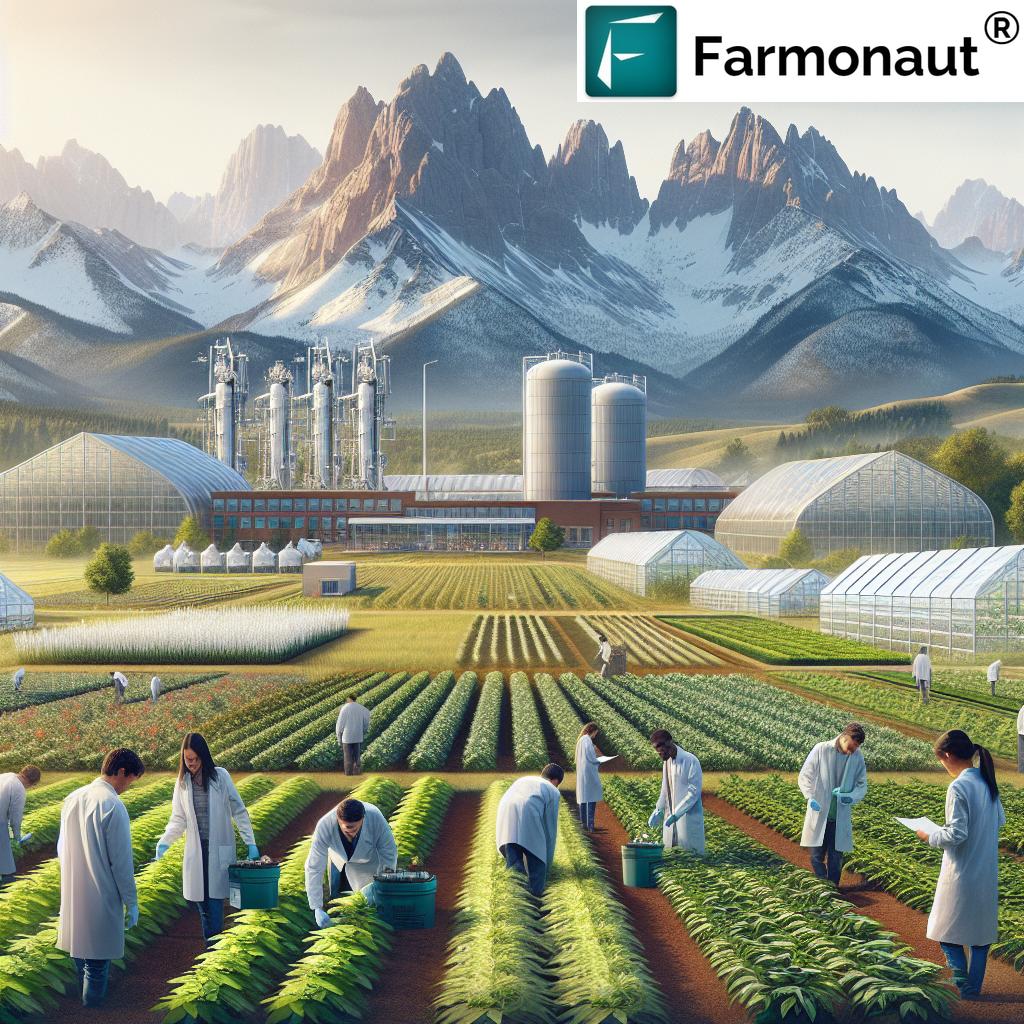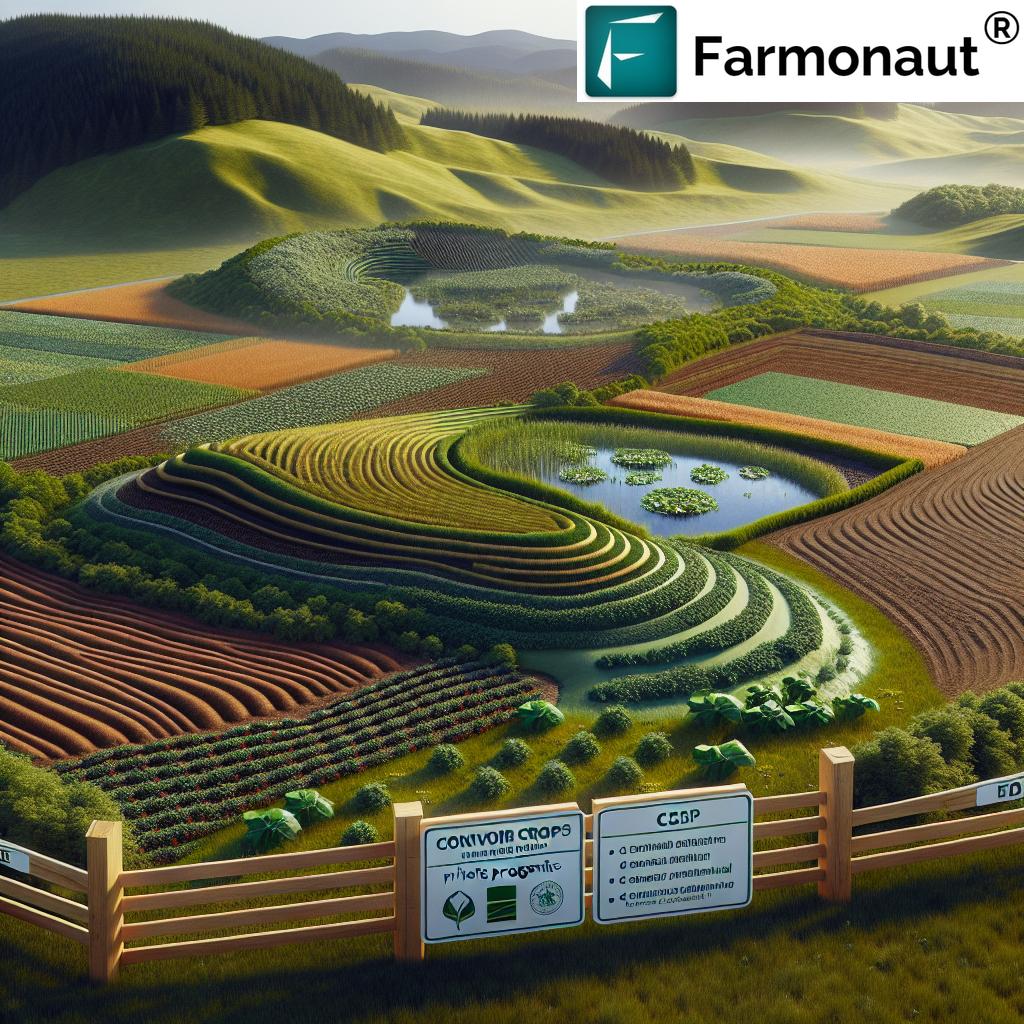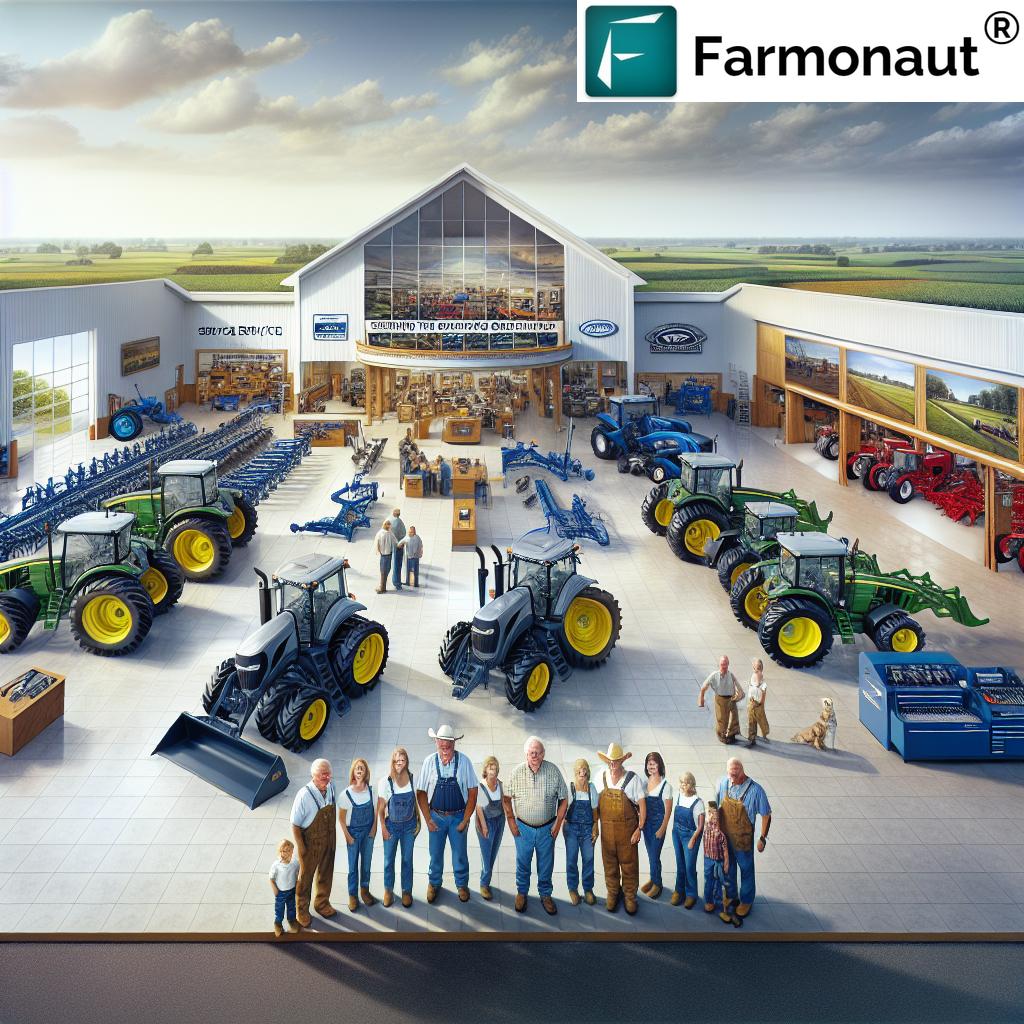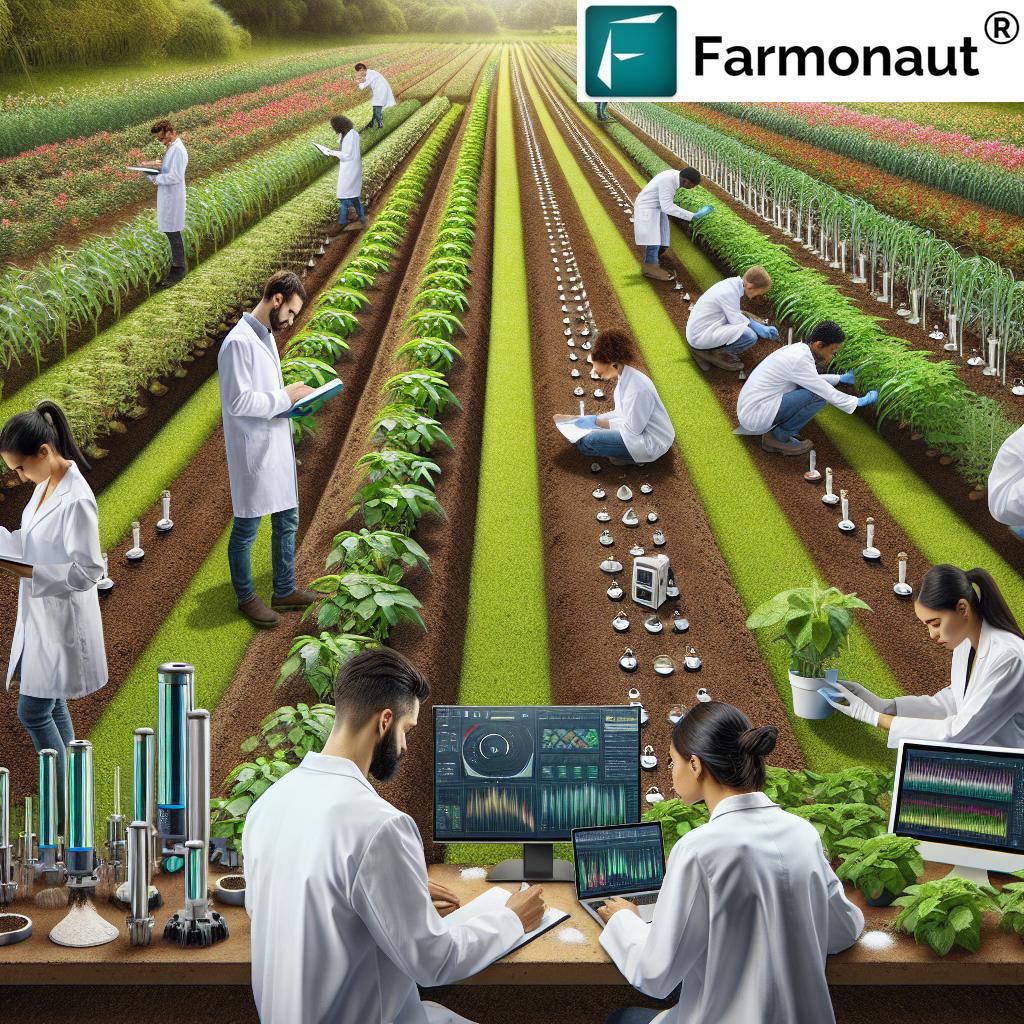Colorado State University’s Agricultural Sciences: Bridging Education, Politics, and Industry
“CSU’s College of Agricultural Sciences event united students from 3+ disciplines, including ag business, political science, and economics.”
We at Farmonaut are excited to explore the recent developments at Colorado State University (CSU) that highlight the intersection of agriculture, politics, and higher education. As pioneers in agricultural technology, we understand the importance of bridging various disciplines to create a comprehensive approach to agricultural sciences. Let’s delve into how CSU is fostering this interdisciplinary environment and preparing the next generation of agricultural leaders.
The Convergence of Agriculture and Politics at CSU
On January 30, Colorado State University’s College of Agricultural Sciences hosted a significant event that brought together students from diverse disciplines, including agricultural business management, political science, and economics. This gathering exemplified CSU’s commitment to interdisciplinary learning and its role in shaping the future of agriculture and politics.
The event featured former Colorado Representative Ken Buck, who visited CSU to engage with students and strengthen his ties with the university community. Despite CSU being outside of his former congressional district, Buck has always been a strong advocate for the university and its research initiatives, given his deep connections to agriculture and livestock.

CSU’s Year of Democracy and Student Engagement
Buck’s visit coincided with CSU’s thematic Year of Democracy, emphasizing the importance of student input in shaping the future of agriculture and politics. The gathering included students from various disciplines, reflecting the diverse interests at CSU and the university’s dedication to community engagement.
During the event, Buck addressed the state of American democracy and participated in a Q&A session where he shared insights from his years in public service. This interaction underscored CSU’s position as a leader in agricultural sciences and research, while also highlighting its commitment to broader societal issues.
Student Experiences at CSU
The event provided a platform for students to share their experiences at CSU, offering valuable insights into the university’s welcoming community and career readiness programs. Let’s explore some of the student testimonials:
- Kai Siep – Agricultural Business Student: Initially aimed to pursue aerospace engineering but was drawn to CSU by its supportive community and career readiness programs in the College of Agricultural Sciences.
- Harper Dorris – Political Science Student and Democracy Ambassador: Appreciated CSU’s well-rounded experience beyond her major and the internship opportunities available to political science students.
- Tangia Zheng – ASCSU Director of Finance: Reflected on her experience working as a congressional intern with Buck during her first year at CSU and expressed ambitions of starting her own company.
These testimonials highlight CSU’s commitment to providing robust support systems and helping students find direction in their careers and studies.
CSU’s Agricultural Sciences Program Overview
| Program Name | Related Disciplines | Industry Connections | Career Opportunities |
|---|---|---|---|
| Agricultural Business Management | Economics, Finance, Marketing | Agribusiness firms, Banks, Cooperatives | Farm Manager, Commodity Trader, Agricultural Consultant |
| Soil and Crop Sciences | Environmental Science, Chemistry, Biology | Seed Companies, Agricultural Research Centers | Agronomist, Soil Scientist, Plant Breeder |
| Animal Sciences | Biology, Veterinary Medicine, Nutrition | Livestock Industry, Feed Companies, Dairy Farms | Animal Nutritionist, Livestock Manager, Animal Welfare Specialist |
| Horticulture and Landscape Architecture | Botany, Design, Environmental Studies | Nurseries, Landscape Design Firms, Botanical Gardens | Horticulturist, Landscape Architect, Urban Planner |
This table provides a comprehensive overview of CSU’s agricultural sciences programs, highlighting their interdisciplinary nature and industry connections. It’s clear that CSU is committed to preparing students for diverse career paths in the agricultural sector and beyond.
Interdisciplinary Approach to Agricultural Education
CSU’s College of Agricultural Sciences stands out for its interdisciplinary approach to education. By combining traditional agricultural studies with political science, economics, and other related fields, CSU is preparing students to tackle complex challenges in the agricultural industry. This approach aligns well with the evolving landscape of modern agriculture, where technology, policy, and business acumen are increasingly important.
“Colorado State University offers 100+ majors across 8 colleges, with Agricultural Sciences being a key focus area.”
At Farmonaut, we recognize the importance of this interdisciplinary approach. Our satellite-based farm management solutions integrate technology, data analysis, and agricultural science to provide comprehensive tools for farmers and agribusinesses. We believe that the future of agriculture lies in this holistic understanding of the field.
Research Initiatives and Industry Partnerships
CSU’s College of Agricultural Sciences is not just about classroom education. The university is deeply involved in cutting-edge research and industry partnerships that provide students with hands-on experience and exposure to real-world agricultural challenges. Some key areas of research include:
- Sustainable agriculture practices
- Climate-resilient crop varieties
- Precision agriculture technologies
- Animal health and welfare
- Agricultural policy and economics
These research initiatives often involve collaboration with industry partners, government agencies, and other academic institutions, providing students with valuable networking opportunities and insights into potential career paths.
The Role of Technology in Modern Agricultural Education
As agricultural technology continues to advance, universities like CSU are incorporating these innovations into their curriculum. From precision farming techniques to data-driven decision-making tools, students are learning to leverage technology to improve agricultural productivity and sustainability.
At Farmonaut, we understand the importance of technology in modern agriculture. Our platform provides valuable services such as real-time crop health monitoring, AI-based advisory systems, and resource management tools. We believe that familiarizing students with such technologies during their education is crucial for preparing them for the future of agriculture.
CSU’s Extension and Engagement Programs
Colorado State University’s commitment to agriculture extends beyond the campus through its robust Extension and Engagement programs. These initiatives bring the university’s research and expertise directly to farmers, ranchers, and rural communities across Colorado. Some key aspects of these programs include:
- Agricultural workshops and training sessions
- On-farm demonstrations of new technologies and practices
- Youth development programs like 4-H
- Community gardens and urban agriculture initiatives
- Rural economic development support
These programs exemplify CSU’s dedication to serving the broader agricultural community and fostering strong connections between academia and industry.
Political Engagement and Agricultural Policy
The recent event featuring former Representative Ken Buck highlights the importance of political engagement in shaping agricultural policy. CSU’s programs encourage students to understand the political landscape and its impact on agriculture. This knowledge is crucial for future agricultural leaders who may influence policy decisions or advocate for the industry’s needs.
Some key areas where politics intersects with agriculture include:
- Farm bills and agricultural subsidies
- International trade agreements affecting agricultural exports
- Environmental regulations impacting farming practices
- Rural development initiatives
- Research funding for agricultural sciences
By exposing students to these topics, CSU is preparing them to be informed and active participants in shaping the future of agriculture.
Career Readiness and Internship Opportunities
One of the standout features of CSU’s agricultural programs is the emphasis on career readiness. The university offers numerous internship opportunities, connecting students with industry partners and government agencies. These experiences provide invaluable real-world exposure and often lead to full-time employment after graduation.
Some notable internship programs include:
- Summer research internships at CSU’s Agricultural Experiment Station
- Cooperative Extension internships in rural communities
- Agribusiness internships with major companies in the sector
- Policy internships with state and federal agricultural agencies
- International agriculture internships for a global perspective
These opportunities align well with Farmonaut’s mission to make precision agriculture accessible to farmers worldwide. We believe that hands-on experience with cutting-edge agricultural technologies is crucial for the next generation of agricultural professionals.
The Future of Agricultural Education
As we look to the future, it’s clear that agricultural education will continue to evolve. The integration of technology, interdisciplinary approaches, and a focus on sustainability will likely shape the curriculum of agricultural programs like those at CSU. Some trends we anticipate seeing more of include:
- Increased focus on data science and analytics in agriculture
- Greater emphasis on sustainable and regenerative farming practices
- Integration of artificial intelligence and machine learning in agricultural decision-making
- More attention to global food security and international agricultural development
- Enhanced focus on agricultural entrepreneurship and innovation
At Farmonaut, we’re excited about these developments and how they will shape the future of agriculture. Our platform is continuously evolving to incorporate new technologies and insights, ensuring that we remain at the forefront of agricultural innovation.
Conclusion: CSU’s Role in Shaping the Future of Agriculture
Colorado State University’s College of Agricultural Sciences is playing a crucial role in bridging education, politics, and industry in the agricultural sector. Through its interdisciplinary approach, research initiatives, and strong community engagement, CSU is preparing the next generation of agricultural leaders to tackle the complex challenges facing the industry.
As we’ve explored in this article, the university’s commitment to providing a well-rounded education that includes hands-on experience, political engagement, and cutting-edge research is setting a high standard for agricultural education. The recent event featuring former Representative Ken Buck is just one example of how CSU is fostering important discussions about the intersection of agriculture and politics.
At Farmonaut, we share CSU’s commitment to advancing agricultural science and technology. We believe that by combining innovative technology with traditional farming practices, we can create a more sustainable and productive agricultural sector. As we continue to develop our satellite-based farm management solutions, we look forward to seeing how institutions like CSU will shape the future of agricultural education and practice.
FAQ Section
- What makes CSU’s College of Agricultural Sciences unique?
CSU’s program stands out for its interdisciplinary approach, combining traditional agricultural studies with political science, economics, and other related fields. It also offers strong industry connections and hands-on learning opportunities. - How does CSU prepare students for careers in agriculture?
CSU offers robust career readiness programs, internship opportunities, and hands-on experience with cutting-edge agricultural technologies. The university also has strong connections with industry partners and government agencies. - What role does technology play in CSU’s agricultural programs?
Technology is integrated throughout CSU’s curriculum, with students learning about precision farming techniques, data-driven decision-making tools, and other innovative agricultural technologies. - How does CSU engage with the broader agricultural community?
CSU has extensive Extension and Engagement programs that bring university research and expertise directly to farmers, ranchers, and rural communities across Colorado. - What are some emerging trends in agricultural education?
Some key trends include increased focus on data science and analytics, greater emphasis on sustainable farming practices, integration of AI and machine learning, and more attention to global food security issues.
Earn With Farmonaut: Affiliate Program
Earn 20% recurring commission with Farmonaut’s affiliate program by sharing your promo code and helping farmers save 10%. Onboard 10 Elite farmers monthly to earn a minimum of $148,000 annually—start now and grow your income!














